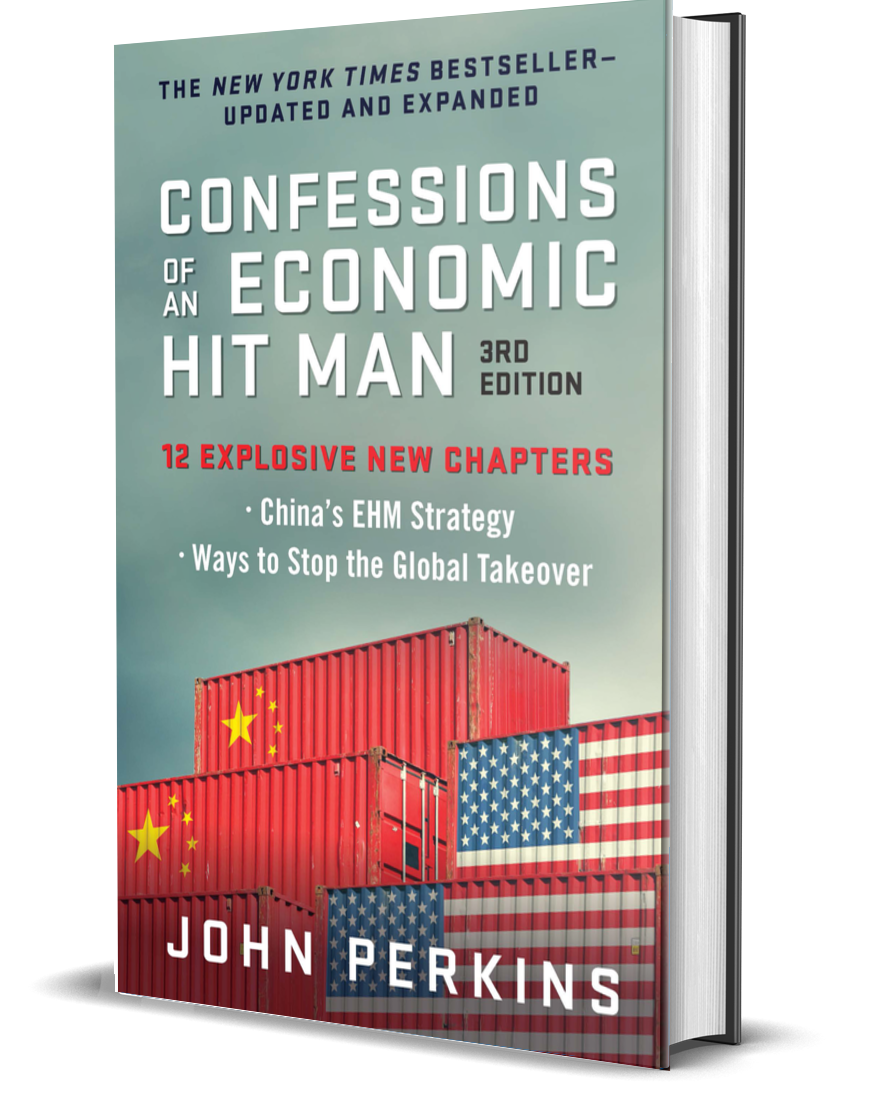Who Will Reign as the World’s Superpower: the US or China?
By John Perkins
One of the characteristics of a superpower in decline is that its economy becomes deeply dependent on other countries. For the Romans, it was resources stolen from their far-reaching empire. For the Spanish, it was Inca and Aztec gold and silver. For the British, a mercantile system that transformed timber, furs, tobacco, sugar, and other resources from North America and the Caribbean into products to sell back to the colonies and the rest of the world.
After the collapse of the Soviet Union in 1991, the United States became the sole superpower; however, in recent years it has been following the path that historically has led to the end of superpower status. Today the US finds itself producing less of nearly everything – except legal documents, mergers, instruments for financial manipulation, and computer software. CEOs have justified sending industrial production overseas because it saves them US labor and pollution-control costs (i.e., exports social and environmental problems to other nations).
So, is the US following in the footsteps of those earlier superpowers?
In an article titled “A Very Dangerous Situation,” The editor of The New York Times daily newsletter, The Morning, David Leonhardt wrote:
The most advanced category of mass-produced semiconductors — used in smartphones, military technology and much more — is known as 5 nm. A single company in Taiwan, known as TSMC, makes about 90 percent of them. U.S. factories make none.
The U.S.’s struggles to keep pace in semiconductor manufacturing have already had economic downsides: Many jobs in the industry pay more than $100,000 a year, and the U.S. has lost out on them. Longer term, the situation also has the potential to cause a national security crisis: If China were to invade Taiwan and cut off exports of semiconductors, the American military would be at risk of being overmatched by its main rival for global supremacy. (1)
Historians in future years will look back at this as a time when the US is yielding the superpower path to China. As I write in my new book Confessions of an Economic Hit Man, 3rd Edition: China’s EHM Strategy; Ways to Stop the Global Takeover (preorder now):
China’s global takeover has become so broad and successful that the dynamics and dangers of it need to receive everyone’s attention. China is now the largest trading partner with countries on every continent. It has beaten out the United States in energy, transportation, communications, and other infrastructure development around the world.
Whatever one thinks of China, whatever its real intent, and despite recent setbacks, it is impossible not to recognize that China’s domestic successes and its modifications to the economic hit man strategy impress much of the world.
Will China replace the US as the world’s dominant superpower? Or is China also in decline, suffering from its anti-COVID policies, aging population, decoupling from global markets, consequences of the war in Ukraine, and falling reputation in many countries?
My new book explores the issues that swirl around such questions in detail. There are chapters devoted to Africa, Asia, Europe, Latin America, and the Middle East. But, as the book points out, the bigger questions are:
Will either country take the leadership role in transforming an economic system that is based on maximizing short-term profits into one based on maximizing long-term benefits for all life?
Will either country lead us from a Death Economy that is consuming and polluting itself into extinction into a Life Economy that invests in cleaning up pollution, restoring devastated environments, recycling, and developing technologies and products that do not ravage the planet?
Whichever country does both of the above will rightfully assume the role of world leader, THE superpower. If neither country does it . . . well asForeign Policycolumnist Stephen M. Walt recently observed:
On climate change, China and the United States are beginning to look like a couple of paddlers on the Niagara River fighting to decide who gets to sit in back and steer, even as their canoe careers toward the falls. (2)
Confessions #3addresses the subjects of its subtitles:China’s EHM Strategy; Ways to Stop the Global Takeover. It also provides tools to help you participate in your own personal way for transforming the Death Economy into a Life Economy. It describes many practical actions you can take — and a 10-minute exercise to help you focus on what aspects will bring you the greatest satisfaction.
By pre-ordering now, you will gain free access to a 90-minute virtual program ($220 value) with me. I will discuss attempts that were made to block the publication of my books and to poison me and I will describe the challenges I faced writing about China’s EHMs. The programs will include time for questions and discussions; recordings will be available.
China’s EHM strategy has just begun.
How did it start, how is it different from America’s EHM model—and what can we do?
Confessions of an Economic Hit Man, 3rd Edition is coming soon…

